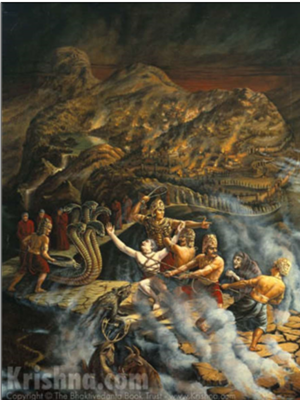Talk:Sharing and Transference of Karmaphala between Individuals/Groups:Voluntary Transfer of Good Karm (Puṇyadāna)
By Vishal Agarwal
Hindu Dharm and Baudh Dharm traditions reject the possibility that we can voluntarily transfer the fruit of our evil actions to others. [1] But conversely, an extremely noble person can gift the fruit of his noble actions to others to alleviate their suffering. Numerous stories to this effect are given in the texts of both these religions. Even in common practice, Elders often take the water of Gaṅgā river in their hand, summon a younger person they adore and make a vow to transfer the fruit of their good deeds to the latter. The following story might be narrated in this regard in Purāṇa-s like Padma and Mārkaṇḍeya Purāṇa –
King Vipaścit Rejects the Pleasures of Svarga (Mārkaṇḍeya Purāṇa, chapter 15): Once, there ruled a virtuous king named Vipaścit. He ruled justly and everyone in his kingdom followed dharm. Those who did not follow dharm by indulging in stealing, killing etc. were jailed and kept under control. All the citizens of the kingdom were happy, prosperous and contented. They all prayed for the long life of their King, and thanked Bhagavān for having given them a noble ruler like him.
When King Vipaścit died, he was taken to heaven. There, he enjoyed the pleasures of heaven for a while. But soon, a thought came to his mind, “I had treated all of my citizens as my own children. I wonder where they are. I can see some of my noble citizens who had died before me, also in heaven. But what happened to my citizens who sometimes disobeyed dharm? Where did they go?” He put this question to Indra.
Indra, the King of heaven said, “King Vipaścit, your citizens who had done evil were taken to hell.” King Vipaścit replied, “Whatever they might have done, they were like my own children because it is the duty of a King to take care of all of his citizens. Therefore, please take me to Hell, where I can see them, at least for some time.” Indra agreed, and the two went to Hell. In Hell, King Vipaścit was deeply pained to see that his evil citizens were suffering in various ways. He wept at their suffering, and asked that he be taken back to Heaven.
But as he was leaving, one of his citizens cried out, “Please do not leave my King. I know that I am suffering due to my own bad karm, but your presence here is making me feel more comfortable.” Another voice said, “You were like our father. How can you leave us here alone? Please do not go away. Even the wind that touches your body and blows towards us carries the coolness of your virtue, and makes it easier for us to bear the pain of our burning bodies.”
Hearing these voices, King Vipaścit was moved greatly. He said to Indra, “Of what use is my stay in heaven if I cannot give any relief and happiness to my former subjects. There is nothing superior to compassion and love. So please leave me behind here in hell. If my presence gives happiness to anyone here and reduces their pain, then I am willing to stay behind in hell, even though it may be the most unpleasant and painful place.”
But Indra refused, and said, “Every creature has to bear the fruit of his or her own karm. If they did bad karm, they must suffer in hell. But you were a virtuous king and had good karm, due to which, you deserve to stay in heaven and not in hell.” King Vipaścit replied, “I did not do good karm with the intent of going to heaven alone. Of what use is good karm if it does not fill one’s heart with love and compassion? Desire for heaven and other fruit of karm can make one a hard hearted and an arrogant person. I want to donate the fruit of all my good karm to these suffering residents of the hell, so that they can return to earth and get one more chance to be good. Or at least, my good karm will reduce the length of their stay here in hell.”
Indra replied, “Any act of charity is also good karm. If you are giving away the fruit of your good karm, then you are earning more good karm. Therefore, all the more reason for you to come to heaven and stay there even longer than you were supposed to!” King Vipaścit replied, “I want to donate all the fruit of my good karm, whether these karmas were performed in the past or whether they will be done in the future. I have no desire to live in heaven. All I want is that everyone should be happy.”
When King Vipaścit had said these words, Bhagavān Viṣṇu appeared in front of them on Garuḍa. He said to the king, “Truly, a person who has no desire for any fruit of good karm, even if it be heaven – that great person becomes fit for mokṣa. So I will take you with me and you will get everlasting mokṣa. Your good karm will be given to your well-wishers.” The soul of Vipaścit then attained mokṣa, and he resided in the company of Bhagavān Viṣṇu forever thereafter. His good karmas were transferred to the residents of hell which shortened their stay in hell, and then they were reborn on this earth.
Another example would be the story of Rṣi Viśvāmitra who performed religious austerities due to which King Triśaṅku starts levitating with his body towards heaven.
References[edit]
- ↑ Mitākṣarā commentary on Yājñavalkya Smṛti 1.9.211 states that one can transfer the merit of his good karmas to his parents, children, the Devas or to Guru but he cannot transfer the demerit of his evil deeds to anyone else.

